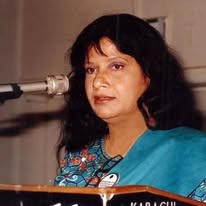KARACHI, Apr 19 (APP): The 13th death anniversary of celebrated poet, journalist, and columnist Abeda Iqbal Azad will be marked on Sunday, drawing heartfelt tributes from literary and media communities across the country.
Known for her evocative poetry, fearless journalism, and thought-provoking columns, Azad left an indelible mark on Pakistan’s cultural and intellectual landscape.
Writers, journalists, and admirers continue to honour her enduring legacy and influence.
“She was a deeply sensitive soul who poured her heart into capturing the emotional and historical weight of the 1971 war period,” remarked Urdu scholar and former Chairman of Urdu Department at the University of Karachi Prof Sahar Ansari.
“Her writing was nothing short of a miracle, and whenever the history of that era in Pakistan is revisited, her documents will undoubtedly hold a place of enduring significance,” he added.
Highlighting Abeda Iqbal Azad’s enduring spirit, the Tamgha–e-Imtiaz recipient linguistic Prof Ansari said, “Abeda Iqbal was optimistic too—always drawn to the brighter side of life, even in the darkest of times. Her unwavering hope and resilience were reflected not only in her words but also in the way she carried herself, inspiring those around her to believe in the possibility of light after the storm.”
Abeda Iqbal Azad was not merely a writer—she was a force of nature, a vibrant blend of intellect, empathy, and courage who used the written word as a weapon against silence and complacency.
Born in Dhaka, Bangladesh, and later based in Karachi, she wore many hats: activist, poet, columnist, translator, and above all, a fierce advocate for truth and justice.
Senior journalist Sheher Bano recalled Abeda Iqbal as a remarkably diverse figure—someone who embodied many roles with equal grace.
“I admired Abeda for her diversity. At times, she appeared as a poet, at others as a journalist. Sometimes she was a humanist, and at other times, an activist. As a woman, she was resolute in her mission to awaken the human conscience through every possible medium,” Bano commented.
After completing her MBBS, Abeda moved to Karachi following her marriage to advertising executive Iqbal Azad Syed. But she preferred taking up reporting and feature writing to explore the layers of societal hypocrisy, injustice, and apathy.
Her move to Karachi marked the beginning of a prolific literary journey, one that would leave an indelible impact on Urdu journalism and poetry alike.
Her poetry, compiled in the collection Aasman, was marked by a lyrical intensity and thematic boldness.
Whether writing about gender oppression, identity, or loss, her verses carried both tenderness and fire. Her acclaimed poem Jirga is a testament to her fearless spirit, boldly criticizing honor killings and societal complicity.
As a columnist, her regular features such as Aaina and Chehre in leading newspapers fearlessly dissected political corruption, societal fractures, and the invisible struggles of everyday people.
She gave voice to the voiceless and raised questions many were too hesitant to ask. Her journalistic series Dateline Dhaka revisited the fall of East Pakistan in 1971, offering a nuanced, humane perspective rarely found in mainstream discourse.
Abeda also made significant contributions as a translator, introducing Urdu readers to global literary figures like Khalil Gibran and Saadat Hasan Manto. Her sensitivity to language and meaning made her translations not only faithful but deeply resonant.
In addition to her literary endeavours, she was actively involved in various civil society movements and non-profit initiatives. A life member of the Arts Council of Pakistan, she often spoke at public forums advocating for women’s rights and the democratization of knowledge.
On her 13th death anniversary, Abeda Iqbal Azad is remembered not just as a writer, but as a legacy—of defiance, grace, and intellect. Her words continue to echo in the corridors of literature and conscience, reminding us that while lives may end, voices like hers never truly go silent.

